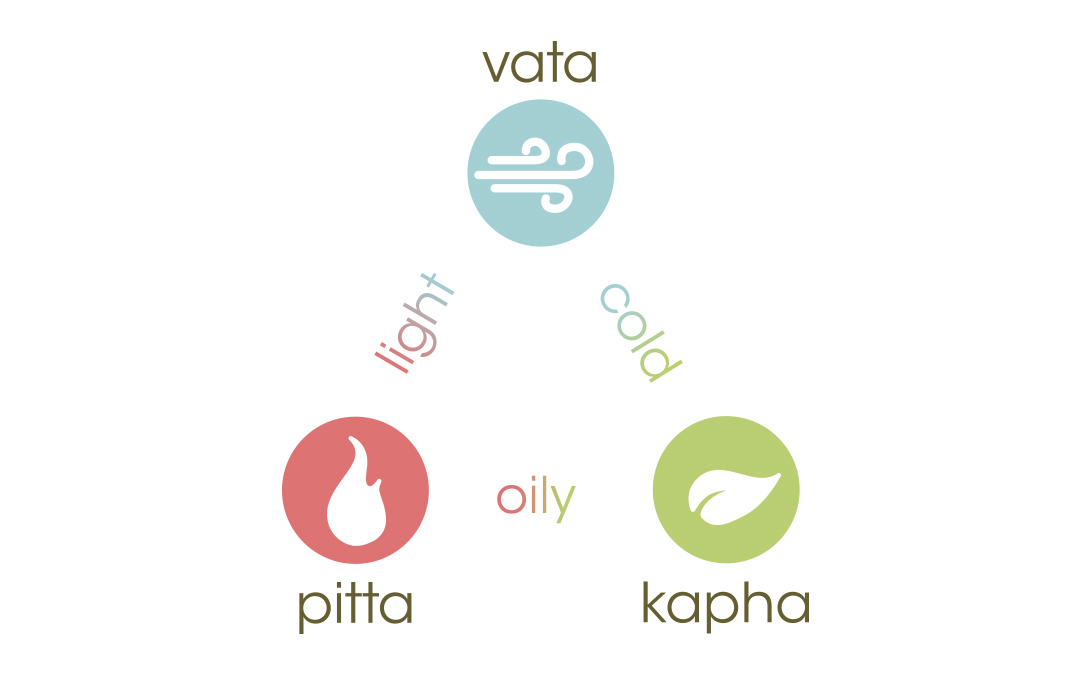Achieving health through Ayurvedic Nutrition, lifestyle and wellbeing.
Ayurveda is a holistic medical system which originated in India thousands of years ago. It focuses primarily on prevention of disease, promoting wellness and good health through proper diet and lifestyle.
Ultimately we want to live in a state of balance (health). When in balance, all the body systems (digestive, endocrine, nervous etc.) and the mind are functioning well. Physically and mentally we feel well and are free of disease.
When we are in a state of imbalance, this will lead to the poor health and disease. Sometimes you may just feel a little ‘under the weather’ or you can’t quite describe how you feel; you just don’t feel yourself. This is also an indication of being imbalanced and the possible development of disease.
The Principles of Ayurveda
According to Ayurveda we are a combination of the three ‘Doshas’ – Vata, Pitta and Kapha. Each Dosha holds specific qualities, which manifest in a our mental and physical state. Everyone is a combination of the three doshas, but in different proportions, which gives every person their own unique physical and mental characteristics. Just as Western science would describe a persons DNA or genetic code.
The qualities of Vata, Pitta and Kapha are a combination of two of the five great elements: ether (space), air, fire, water and earth. Understanding the characteristics of the three Doshas and how they physically and mentally present themselves can help people stay in balance (good health).
Vata is a combination of ether and air. These elements give the qualities of light, dry, movement, rough, cold, subtle and clear. A person who was mainly of Vata constitution may present the characteristics of ‘light’ as in lightness of body or low bodyweight and small frame.
Movement may present itself as movement of the nervous system or muscles, so they may be ‘twitchy’, always on the go, or have a strong desire to travel or move around a lot. Movement is also linked to movement of food, so it would affect how food passes through the digestive system and how it’s eliminated from the body. Rough, dry and cold may present themselves as rough, dry skin or dryness of the colon e.g. constipation.
Vata also governs emotions such as fear, anxiety, nervousness, pain and tremors. The main sites of Vata are the large intestine, pelvis, bones, skin, ears and thighs. If excess Vata develops in the body it generally accumulates in these areas.
Pitta is a combination of fire and water. These elements give the qualities of hot, light, oily, sharp or penetrating and liquid. Pitta translates as bodily heat-energy. Pitta governs the digestion, absorption and assimilation of food as well as body temperature, skin colouration, and intelligence and understanding. Emotions of anger, hate and jealousy are also governed by Pitta.
A person of mainly Pitta constitution may present these characteristics as warm body temperature, oily skin, strong metabolic fire (digestion and appetite). They are more likely to suffer from inflammatory conditions, indigestion and heartburn.
The main site of Pitta is the small intestine, stomach. sweat glands, blood, fat and eye. If excess Pitta develops in the body it generally accumulates in these areas.
Kapha is a combination of earth and water. These elements give the qualities of oily, cold, heavy, sticky, firm (as in steady) dull (as in slow). Kapha provides the grounding element to the mental and physical body. Kapha maintains natural resistance and immunity, provides structure and stability and lubricates the body.
A person of mainly Kapha constitution may present these qualities as heavy or larger body frame with a greater affinity for weight gain. Strong immunity and soft, moist skin.
The main sites of Kapha are the chest, throat, head sinuses, nose, plasma and liquid secretions of the body. If an excess of Kapha accumulates in these areas it may manifest as accumulation of mucus, chest infection or an accumulation of body fat. If excess Kapha develops in the body it generally accumulates in these areas.
Kapha supports the memory and is responsible for emotions such as attachment, greed and long standing envy. Kapha can also be expressed in emotions such as calmest, forgiveness and love.
Understanding your Dosha or Ayurvedic type will help you choose foods that will keep you in balance and good health. You can take Dosha Quiz here to find out more about your Ayurvedic type.
How to stay in balance
Food also present the qualities of the 5 great elements (ether, air, fire, water and earth). According to Ayurvedic principles – ‘Like increases like and opposites regain balance’. If a person of mainly Vata constitution had a diet of mainly dry, rough, cold foods (raw vegetables, salads, nuts and seeds) this would lead to an increase in Vata which can lead to imbalance and development of disease. This also applies to the characteristics of Pitta and Kapha.
Food also present the qualities of the 5 great elements (ether, air, fire, water and earth). According to Ayurvedic principles – ‘Like increases like and opposites regain balance’. If a person of mainly Vata constitution had a diet of mainly dry, rough, cold foods (raw vegetables, salads, nuts and seeds) this would lead to an increase in Vata which can lead to imbalance and development of disease. This also applies to the characteristics of Pitta and Kapha.
Habitually consuming foods with the same qualities as your Doshic type will affect your digestive fire (agni) and ultimately your ability to digest, absorb and assimilate the food you eat. Undigested food leads to an accumulation of toxins in your body and mind. In Ayurveda, toxins are referred to as ama.
You can see a build up of ama as the white coating on your tongue. It’s completely normal to see this at the back of your tongue, and most people have it to some degree. However, if this coating covers the tongue, is thick or changes colour, it is a good indication that there is a excess ama in your body which can lead to poor health.
The key to eating right for your Ayurvedic type and maintaining good health is to ensure your digestive fire (agni) is working well. Too much of the wrong type of food can affect your digestive fire resulting in poorly digested food and a build up of ama. Find out more about ‘Eating for Your Ayurvedic Type here’.
As well as a build up of physical ama through an accumulation of undigested food, mental ama can also build up due to a build up of unprocessed thoughts.
In Ayurveda, there is a strong belief that you should take responsibility for our own health. You should be aware and witness the effect that diet and lifestyle has on your health and change it if you feel it is affecting your physical and mental wellbeing.
This is something a great deal of people in the West have lost touch with. Western forms of medicine focus on treating the symptoms of poor heath and disease e.g. treating skin conditions with steroid creams and not dealing with the dietary and lifestyle factor which are the cause of he skin condition in the first place. Ayurveda, on the other hand, focuses on the root cause and treats that.



Very informative, thank you